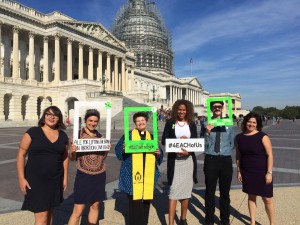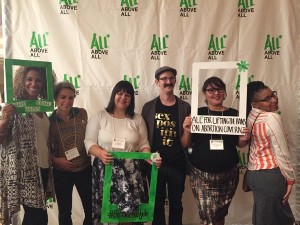Four Myths About the Fight For $15 Movement
By Elizabeth Borngraber
After New York State passed the minimum wage increase to $15 for fast food workers last month, my initial reactions were mixed. My social work brain was happy people would be earning a living wage, but arguments against $15 made me worry about the economic impact of the ruling. Fast-food chains could start firing employees because of higher costs. Jobs could disappear and unemployment could rise. Advanced degree holders could earn a position paying less than a job requiring no degree. All these things sounded scary, so I decided to do some research and found the following arguments against raising the minimum wage:
Forcing employers to pay $15 will cause prices to rise and jobs to decrease.
Now, I’m no expert on economics, but according to the Economic Policy Institute, if the minimum wage had been adjusted each year for inflation it would be about $11 an hour. Change that adjustment to be based on productivity and that increases to approximately $18 an hour. Given those figures, $15 an hour seems a good compromise for wages that should be higher anyway. And while not explicitly citing the $15 wage, the United States Department of Labor states that there has been no study to prove that increasing the federal minimum wage will result in job loss. In order to combat any negative effects, the Political Economy Research Institute suggested strategies to raise fast-food wages to $15 without losing jobs. And a study by Purdue University shows that food prices would most likely increase only a little. With some creative thinking on the part of business owners, $15 an hour is possible and profitable.
Fast-food workers have minimum motivation and, therefore, shouldn’t be paid more than minimum wage.
Other than reasons of economics, this is probably the number one argument against $15 an hour that I found. Many opponents of the bill argue that fast-food jobs are meant for high school or college students or those looking to supplement a second full-time income and any person who views it as a career must not have any motivation to better themselves and find a higher paying job. However, this argument starts to fall apart when you consider the fact that not everyone can access the education required for other jobs and those living in rural areas face career opportunities that are far more limited. When you grow up in a small town and do not have as many resources, fast-food restaurants may provide you with the easiest and most accessible form of income. Since realities like these are not under the control of the individual, people should not be subjected to living in near poverty because of the place they were born. While many studies show that college graduates earn more than those without, not everyone is well suited to pursing a college degree.
As social workers, we value the right of client’s to choose their own path and sometimes that means not pursing higher education. Therefore, we need to advocate for jobs that pay a living wage regardless of formal education. Forcing someone to live off of $8.75 an hour ($18,200/year pretax) because they didn’t go to college or grew up in an area with limited career opportunities perpetuates generational poverty within families and communities. In turn, these individuals rely on public assistance in order to help pay for food, housing, and health insurance. Wal-Mart workers alone cost taxpayers $6.2 billion dollars a year. If companies paid their workers more, fewer burdens would be placed on the average American to subsidize low wages.
Minimum wage jobs are not as valuable to society as other jobs.
This goes back to America’s bias for valuing people with a college degree over those without. Don’t get me wrong, as someone with a Bachelor’s and currently pursuing a Master’s degree, I understand the importance of higher education and its effects on poverty. However, I also don’t believe in putting all of your eggs in one basket. If everyone is expected to go to college, those who don’t will be forced out of any job that provides a living wage. These minimum wage jobs include things like farm workers, home care and child care employees, and housekeepers and cleaners. Just because someone didn’t study four years at a university in order to earn their position, doesn’t mean it is any less valuable to the functioning of our society. If you’ve ever eaten produce, dropped your child off at day care, or enjoyed the comforts of a clean hotel room, you’ve most likely benefitted from the services of an underpaid worker.
Most minimum wage workers are teenagers.
The average minimum wage worker is a 20+-year-old white female, who works full-time and might have children. She has most likely graduated high school and may have completed some college coursework. For many of us, this picture is not surprising since women are paid 78% of what men earn (even less for women of color) and women are more likely to be living in poverty than men due to a variety of factors including the jobs they hold. According to The Center For American Progress, careers such as teaching, nursing, waitressing, and child care are still traditionally held by women who earn an average of $27,383 a year. Since many single parent households have a female head of house, and many women still take on the brunt of financial costs related to children, what does this mean for women trying to start and raise families?
The real reason you should be upset about Fight for $15 isn’t because fast-food workers will be earning more, it’s because we live in a democracy that doesn’t provide equal opportunities and fair wages for all jobs. We should support raising the minimum wage overall because businesses have an ethical responsibility to provide workers with fair pay. Many social workers who work with disenfranchised populations see the effects low-wages have on the functioning of an individual and a family. For women trying to make ends meet as a fast-food worker or child care provider, low wages restrict their access to birth control options and ability to raise a family in a financial stable environment. After all, self-determination and empowerment can only go so far when a client is facing a structural inequality.
Elizabeth Borngraber is a graduate student in the University at Buffalo School of Social Work in New York state whose studies and interests are focused around women’s health and rights, healthcare access, and policy.


